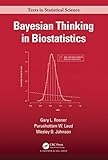Bayesian thinking in biostatistics
Material type: TextPublication details: CRC Press Boca Raton 2021Description: xix, 601 pISBN:
TextPublication details: CRC Press Boca Raton 2021Description: xix, 601 pISBN: - 9781439800089
- 570.15195 ROS
| Item type | Current library | Collection | Call number | Copy number | Status | Date due | Barcode | |
|---|---|---|---|---|---|---|---|---|
 Book
Book
|
Indian Institute of Management LRC General Stacks | Operations Management & Quantitative Techniques | 570.15195 ROS (Browse shelf(Opens below)) | 1 | Available | 004365 |
Table of Contents
1. Scientific Data Analysis 2. Fundamentals I: Bayes Theorem, Knowledge Distributions, Prediction 3. Fundamentals II: Models for Exchangeable Observations 4. Computational Methods for Bayesian Analysis 5. Comparing Populations 6. Specifying Prior Distributions 7. Linear Regression 8. Binary Response Regression 9. Poisson and Non-linear Regression 10. Model Assessment 11Survival Modeling I: Models for Exchangeable Observations 12. Survival Modeling 2: Time-to-Event Regression Models 13. Clinical Trial Designs 14. Hierarchical Models and Longitudinal Data 15. Diagnostic Tests
With a focus on incorporating sensible prior distributions and discussions on many recent developments in Bayesian methodologies, Bayesian Thinking in Biostatistics considers statistical issues in biomedical research. The book emphasizes greater collaboration between biostatisticians and biomedical researchers. The text includes an overview of Bayesian statistics, a discussion of many of the methods biostatisticians frequently use, such as rates and proportions, regression models, clinical trial design, and methods for evaluating diagnostic tests.
Key Features
Applies a Bayesian perspective to applications in biomedical science
Highlights advances in clinical trial design
Goes beyond standard statistical models in the book by introducing Bayesian nonparametric methods and illustrating their uses in data analysis
Emphasizes estimation of biomedically relevant quantities and assessment of the uncertainty in this estimation
Provides programs in the BUGS language, with variants for JAGS and Stan, that one can use or adapt for one's own research
The intended audience includes graduate students in biostatistics, epidemiology, and biomedical researchers, in general.
There are no comments on this title.
